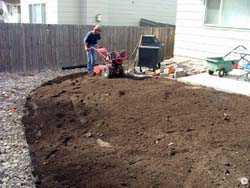Can I start a new lawn out of seed?
A lawn can be successfully started from seed anytime during the growing season. However, it’s easier to establish cool-season grasses, such as Kentucky bluegrass, in late summer. Warm season grasses, such as buffalo grass, are usually seeded in May or June.
What should I do before seeding grass?
 Before seeding grass, have a basic soil test done to help determine specific fertilizer requirements. Control perennial weeds in the area to be seeded prior to disturbing the soil. If you use an herbicide, select one with no residual activity.
Before seeding grass, have a basic soil test done to help determine specific fertilizer requirements. Control perennial weeds in the area to be seeded prior to disturbing the soil. If you use an herbicide, select one with no residual activity.
What should I do to the area before seeding?
Cultivate the area to be seeded to loosen the top 12 inches of soil, and make any grade adjustments to direct drainage away from building foundations. Remove large rocks and other debris. Rototill three to five cubic yards of decomposed manure, compost or sphagnum peat moss, along with fertilizers specified by the soil test results, into the top six to eight inches of soil. Otherwise, apply any starter-type lawn fertilizer according to the instructions provided per 1000 square feet. Next, smooth and firm the soil surface to be seeded. Broadcast seed in two directions to evenly apply the recommended rate. Then gently drag the back side of a rake over the surface to lightly cover seed with soil.
How much should I water newly seeded areas?
Water lightly and often enough to keep the surface of the soil moist during seed germination, which can take up to two weeks. Watering frequency will be determined by time of year and weather conditions. As the roots grow deeper into the soil, gradually decrease the frequency and increase the amount of water to encourage deep rooted, healthy plants.
For “Soil Tests” refer to message number 1606.
For more information, see the following Colorado State University Extension fact sheet(s).



